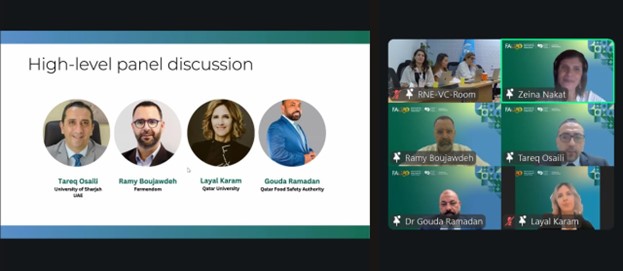Building safer food systems through collaboration and innovation: Highlights from the FAO Science and Innovation Forum regional event

In the framework of the Science and Innovation Forum (SIF) 2025, which focuses on advancing innovation for sustainable agrifood systems, the Food and Agriculture Organization of the United Nations (FAO) organized a dedicated event to launch the Regional Food Safety Research and Innovation Network. This event brought together experts, policymakers, and researchers from across the Near East and North Africa (NENA) region to strengthen regional collaboration on food safety and innovation. Held in Cairo on 2 October 2025, the regional event marked a key milestone in fostering collaboration, knowledge exchange and joint action among regional partners to strengthen food safety research and innovation
At the welcoming session, Vincent Martin, Director of the Office of Innovation (OIN) at FAO, and Abdulhakim Elwaer, FAO Assistant Director-General and Regional Representative for the Near East and North Africa, underscored the importance of investing in science, data, and partnership to ensure that food safety remains at the heart of regional agrifood transformation.
During the opening session, Bassel Daher, Coordinator for Research Network at FAO Regional Office for the Near East and North Africa (RNE), presented the Network’s governance framework and guidelines, emphasizing the need for joint action and the creation of technical working groups to operationalize the network’s priorities. “Collaboration across research, policy, and implementation is the only way we can truly reduce risks and strengthen consumer trust,” he noted.
A keynote address by Masami Takeuchi, FAO Food Safety Officer, highlighted how innovation can serve as a bridge between resilience and safety. She noted that new technologies, ranging from digital traceability systems to real-time monitoring tools, are reshaping how food safety challenges are identified and managed globally.
The first high-level panel discussion featured distinguished speakers from partner institutions, Marcello Scalisi, Director for UNIMED and Damiano Petruzzella, Scientific Administrator for CIHEAM. The panelists explored how regional cooperation can drive progress toward harmonized standards, shared databases, and integrated surveillance systems. Following an engaging Q&A session, the event continued with an interactive panel discussion moderated by Zeina Nakat, a Regional Agro-food expert, Trainer and Lead Author. Her session encouraged a deeper reflection on four interconnected pillars of food safety: research, innovation, capacity building, and policy harmonization. Tareq Osaili from the University of Sharjah, Ramy Boujawdeh from Fermendom, Layal Karam from Qatar University, and Gouda Ramadan from Qatar Food Safety Authority shared practical insights on how to bridge scientific knowledge with field implementation. The lively exchange of discussion revealed a shared commitment to turning collaboration into tangible outcomes, with participants stressing the importance of data sharing, sustained training, and harmonized regulatory frameworks.
In closing, Ahmad Mukhtar, FAO RNE Regional Programme Leader (OiC) and Senior Economist and FAO Representative to UAE, reflected on the day’s discussions, emphasizing that food safety is not a stand-alone goal but a cornerstone of public health, trade, and sustainable development. “The path ahead requires collective ownership and shared accountability. Through this Network, we are building not just safer food systems, but stronger regional cooperation,” he said.
The event, coordinated by Faten Adada, Agriculture and Rural Development Expert at FAO RNE, concluded with a clear sense of momentum and purpose. Moving forward, the Regional Food Safety Research and Innovation Network will build on this foundation by developing a dedicated website to serve as a regional knowledge hub, connecting experts and institutions and facilitating access to research outputs, technical resources, and training materials. The Network also plans to establish thematic working groups, organize joint research initiatives, and foster partnerships with universities, national food safety authorities, and regional organizations. Through these efforts, the Network will continue to act as a catalyst for collaboration, capacity development, and innovation-driven solutions to ensure that safe food becomes a reality for all across the NENA region.
